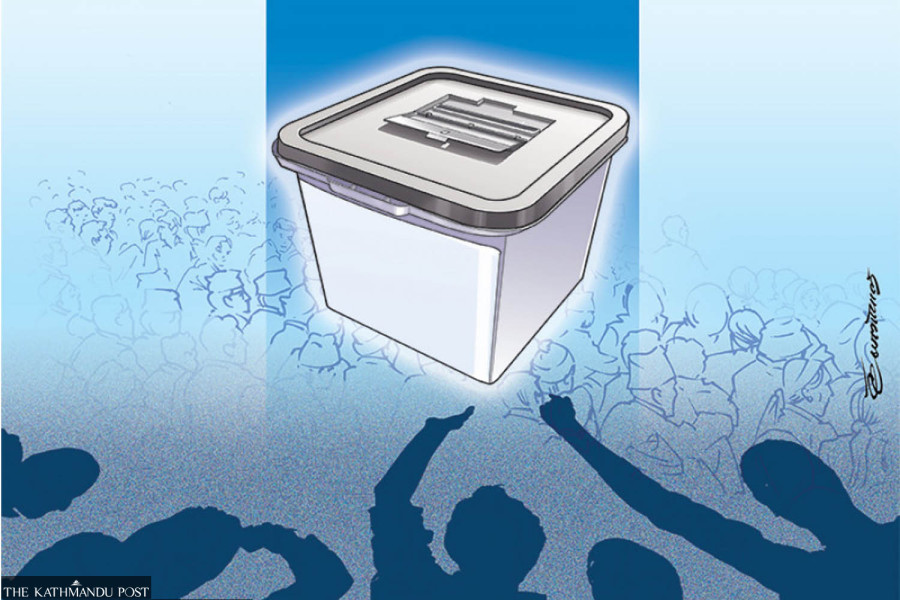Politics
Mental health absent from poll manifestos
Leaders of political parties say they are aware of the problems and their commitments on health covers the issue.
Post Report
A few days ago, a Nepali couple in their mid-thirties visited the Psychiatric Department at the Tribhuvan University Teaching Hospital seeking treatment. Doctors attending the patients said the couple had returned from abroad a year ago—the husband from South Korea and the wife from Israel. Both have serious mental health issues.
“They had admitted their children to a hostel and had gone abroad for employment,” said Dr Saroj Ojha, a consultant psychiatrist. “But the husband and wife could not stay away for long leaving behind the children in Nepal, so both returned home. Once in Nepal, they did not have a sustainable source of income, so the family started having problems.”
Lately, more people are having mental problems as they struggle to cope with financial, educational, employment, health and family issues. Stress, anxiety, and trauma exacerbates mental health problems, according to doctors.
And what concerns mental health experts is, the issue still remains neglected by the major political parties in Nepal.
“Healthy human resources are instrumental for the development of a country,” said Ojha. “How can we bring prosperity to the country without addressing the mental health problems from which hundreds of thousands of people are suffering.”
A study carried out by the Nepal Health Research Council shows that about 13 percent of the population suffers from some form of mental disorder, which means around one in eight people has mental health issues.
Doctors say there were mental health problems in the past and they are rising at present due to various factors including the Covid pandemic, which upended the lives of all sections of society.
People have been also struggling to meet basic needs—food, housing, health care, job security, and others. The use of drugs, alcohol and other substances has also fueled the problems. Cases of suicide have been rising of late.
Data provided by the Nepal Police show 6,792 people died by suicide (over 18 people on average daily) in the fiscal year 2021-022. The number was lower than that of the previous fiscal year, 2020-2021, when 7,117 (over 19 each day) took their own lives.
“The apathy to address mental health issues by major political forces shows is appalling,” said Dr Basudev Karki, a consultant psychiatrist. “One should understand that mental health problems are not only limited to any group or a particular community. The problems can be the story of every household. The problems will not go by sweeping them under the rug.”
Experts on mental health say there is a tendency in Nepali society of concealing mental health issues, largely due to the stigma attached to it and this stigma has its roots in lack of education.
A few days ago, an 18-year-old girl from Kathmandu, who has been pursuing a nursing degree reached the Mental Hospital, Lalitpur. Despite being from a well-to-do family and having been able to pursue the career of her own choice, the girl was not satisfied with herself.
“We found that the girl was suffering from a severe form of depression,” said Karki. “We counseled her and recommended some medicines. Mental health problems persist in each and every part of society, whether they are children, adults or elderly people.”
Nepal is set to vote in parliamentary and provincial elections in a few days and all parties and candidates have published their manifestos, but none have spoken about mental well-being.
But several politicians approached by the Post, however, claimed that they are aware of mental health issues and would bring programmes to tackle the problems if they got a chance to form government after the elections.
“It is not possible to mention each and every topic in the manifesto,” said Jeevan Pariyar, spokesperson of Nepali Congress’s polls manifesto drafting committee. “Just because we have not mentioned the issue in our manifesto does not mean we are not aware of the problems and will do nothing to address them.”
Similarly, CPN-UML leaders said their party takes mental health seriously and is committed to addressing all existing and emerging health issues including those related to mental health.
“We are well aware that a nation’s health is determined by its people’s health,” said Bishnu Rijal, deputy chief of the publicity department of the CPN-UML. “Health figures in our manifesto and this covers mental health as well.”




 18.12°C Kathmandu
18.12°C Kathmandu














